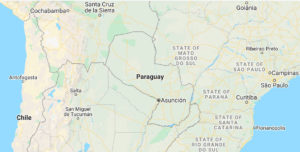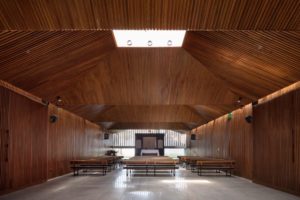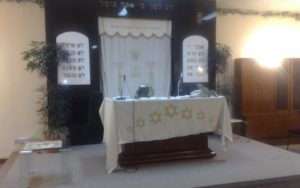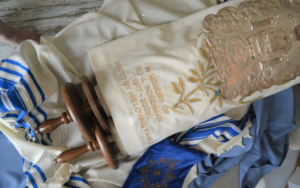 The first Jews in Paraguay were marranos, who arrived with the first Spanish conquistadores in the early 1500s. The modern community began to develop at the turn of the century, some 100 years after Paraguay declared independence from Spain.
The first Jews in Paraguay were marranos, who arrived with the first Spanish conquistadores in the early 1500s. The modern community began to develop at the turn of the century, some 100 years after Paraguay declared independence from Spain.
Jewish immigration to Paraguay began in 1904. Jews came to Paraguay from France, Switzerland, and Italy and merged with the native population without ever establishing a community. On the eve of World War I, a number of Sephardi Jews emigrated from Palestine. In 1913, the Sociedad Templo Israelita Latino, Paraguay’s first and only Sephardic synagogue was founded.
 In the early 1920s Jews from the Ukraine and Poland founded the Ashkenazi community, Union Hebraica. There were some short-lived anti-Semitic decrees in 1936, and some anti-Semitic incidents prior to the establishment of the regime of General Alfredo Stroessner in 1954; however, after that, Jews were not disturbed.
In the early 1920s Jews from the Ukraine and Poland founded the Ashkenazi community, Union Hebraica. There were some short-lived anti-Semitic decrees in 1936, and some anti-Semitic incidents prior to the establishment of the regime of General Alfredo Stroessner in 1954; however, after that, Jews were not disturbed.
From 1933-1939, around 20,000 Jews from Germany, Austria, and Czechoslovakia took advantage of Paraguay’s liberal immigration laws to escape from Nazi-occupied Europe. Most of them used Paraguay or their Paraguayan visas as stepping stones to Argentina, Brazil, and Uruguay where immigration laws were more severe.
 Konstanty Rokicki, the Polish Consul in Bern produced several thousand illegal Paraguayan passports to save Jews stranded in ghettos in Poland. During 194-1943, Rokicki and Jewish diplomat Juliusz Kuh, forged passports, which were smuggled into Poland and the Netherlands. These passports helped to prevent Jews from being sent to death camps like Auschwitz. The Paraguayan passports are estimated to have saved at least 700-800 lives.
Konstanty Rokicki, the Polish Consul in Bern produced several thousand illegal Paraguayan passports to save Jews stranded in ghettos in Poland. During 194-1943, Rokicki and Jewish diplomat Juliusz Kuh, forged passports, which were smuggled into Poland and the Netherlands. These passports helped to prevent Jews from being sent to death camps like Auschwitz. The Paraguayan passports are estimated to have saved at least 700-800 lives.
 After World War II, most Jews that arrived in Paraguay were survivors of concentration camps. After a 1947 internal revolution and the establishment of the State of Israel a year later, Paraguay’s Jewish community began declining.
After World War II, most Jews that arrived in Paraguay were survivors of concentration camps. After a 1947 internal revolution and the establishment of the State of Israel a year later, Paraguay’s Jewish community began declining.
Currently, Jewish-Paraguayan community is about 900-1,000 people, most of them located in the capital Asunción. Paraguay has three synagogues, and a Jewish school called Escuela Integral Estado de Israel, which provides primary and secondary education. There is a high rate of assimilation and intermarriage in the Jewish population in Paraguay.